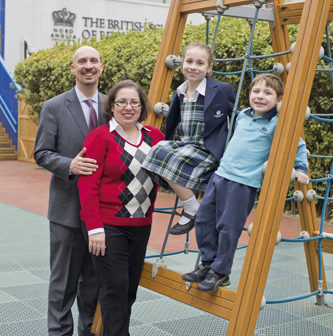There’s no one size-fits-all solution when it comes to choosing a school. Selecting a school for your child is an individual journey for every family. Their final choice will take into account their unique situation, considering location, their child’s character, their other financial commitments, daily schedules and commutes, and their family’s culture, traditions, and values.
As we head toward summer, some parents may be seeing that even after considerable effort researching and visiting campuses, the current school is just not working out for their little ones. Beijing has a huge selection of schools; sifting through the options may initially seem daunting. We speak to admissions experts at Beijing City International School (BCIS) and The British School of Beijing, Sanlitun (BSB) to hear their advice.
The British School of Beijing,
Sanlitun
New Zealander Prue Harman is the admissions team leader at BSB. Her association with the school began when her family first arrived in Beijing five years ago; she chose BSB for her children. When an admissions role became vacant a year later, Harman was happy to take a job where she could share with prospective families what she loves about the school.

Harman says that the first step for parents is to find a list of schools in Beijing such as the beijingkids School Choice Guide. If you live in Beijing, Harman says fairs such as the Beijing International School Expo can be extremely useful in creating a shortlist. She recommends that parents look at minimizing commuting for most members of the family, considering the location of their compound, schools, and workplaces to see how they can spend the least amount of time each day snarled up in traffic. She says parents should next look at instruction and curriculum. “The most important factor is finding an environment where your child will thrive and achieve their potential,” says Harman, recommending an individualized approach to learning where children will be challenged and motivated; extended if academically advanced, or supported if there are gaps or learning difficulties.
She says the most important step is the school visit. “You must talk to teachers and look inside classrooms,” says Harman, “And check that students look engaged and happy. If you absolutely can’t make it to Beijing to visit in person, arrange Skype or phone calls with admissions personnel, and ask to be put in touch with current parents of children with similar ages to yours.”
BSB Sanlitun offers rolling admissions throughout the year without a deadline. Over the last few years, BSB have worked to simplify the process. “We have an e-version of our application form and accompanying documents can be scanned, so the whole process can be done by email,” says Harman. For Beijing-based families there’s an in person meeting an assessment, for families overseas BSB Sanlitun requests teachers’ recommendations.
Harman says BSB Sanlitun is open to parents who will be supportive of their child’s education and become active members of the school community. BSB Sanlitun values families who appreciate diversity and respect for other nationalities, cultures, and backgrounds. For Harman the hardest part of her job is saying the inevitable goodbyes as families move on. “But thankfully many stay in touch, and I have a great network of BSB Sanlitun friends all over the world,” she says.
The Simmons Castellanos Family
Americans Dennis A. Simmons and Monica Castellanos Simmons are both US diplomats, assigned to the Embassy in Beijing since July last year. Dennis is a Commercial Officer with the US Department of Commerce and Monica is a Human Resource Officer with the US Department of State. Their children Kayla (age 7) and Zachary (4) are both enrolled at BSB Sanlitun.
The family created a short list by considering curriculum and location as top factors, searching for schools with COBIS (Council of British International Schools) accreditation. “It was important to stick to the same system,” says Monica. BSB Sanlitun quickly became their first choice because of its’accreditations, location, small class and campus size, and also because of their interactions with the admissions team. “Prue made us feel as if we were part of the community well before we arrived in Beijing or before our children sat foot on the campus,” she says. “In many ways, it was Prue’s communication style and reassuring nature that made us want to be part of the BSB Sanlitun community.”

Beijing City International School
At Beijing City International School (BCIS) we speak to Stacy Wang, admissions manager, a Chinese national, who joined BCIS in May last year. She brings a wealth of experience to BCIS, having been admissions officer and community liaison at International School of Beijing (ISB) for the previous five years. We also hear from Fijian Director of Communications, Sam Savou, a parent and member of the BCIS community since 2008, when he moved to China as a diplomat with his family. He joined the BCIS team in June 2015 as Director of Communications.

Savou recommends thoroughly researching your options, and cites school visits as essential. “A school tour affords an understanding and insight into the school that a desk top search cannot provide,” he says. “These priorities could be an international education, the language of instruction in school, the class sizes and student teacher ratio’s, the reputation of the school, and the teaching philosophy and quality of the education program,” says Savou. BCIS is approved to accept Chinese nationals alongside international students; a factor Savou says enables them to experience the culture, language, people, and traditions of China, among a cosmopolitan student body.
Location is another obvious key factor; Savou points out that BCIS’s campuses are located centrally in Shuangjing, in the Central Business District (CBD) of Beijing, conveniently located close to many families’ workplaces.

Wang says BCIS selects students from all nationalities and works to maintain a balanced enrollment based on each student’s academic history, interests, English language proficiency, and fit. The school also takes into account the diversity of the student population. Wang says that after a school visit and tour, the admissions team administers assessments, carries out a review of the application documents, undertakes a student and parent interview, and on occasion facilitates a classroom observation session to select students and families suitable for the BCIS community. “The hardest and most stressful part of our job is when we have to decline a candidate’s enrollment and deliver the bad news to the family,” says Wang. On the other hand the larger and most enjoyable part of her role is working with prospective students and parents, and welcoming successful applicants to the school.
The Lawson Family
Australians Christopher Lawson and Minh Bui have lived in Beijing since January 2014. They moved here for Christopher’s work as a diplomat for the Australian Embassy. Both of their children, Samantha (age 12) and Kane (10) attend BCIS. Minh says they were interested in a school with an IB curriculum, and they wanted a K-12 school located within ten kilometer of their home. “We also wanted a school that had been used by families of the Australian Embassy in the past and one where a daily uniform is not required,” she says. BCIS’s track record in academic achievements was also an important factor. In making their selection, the Lawsons reviewed information available on the BCIS website and sought feedback from embassy families that already had children attending BCIS, prior to applying. “The application process itself was one of the important factors in our choosing BCIS,” Minh says. “It was simple and straight forward, with very timely communication from both the administration team and the Principal.”
This article originally appeared on page 34-36 of the April 2016 Issue of beijingkids. Click here for your free online copy. To find out how you can obtain a hard copy, contact distribution@truerun.com.
Photos: Uni You and courtesy of BCIS




